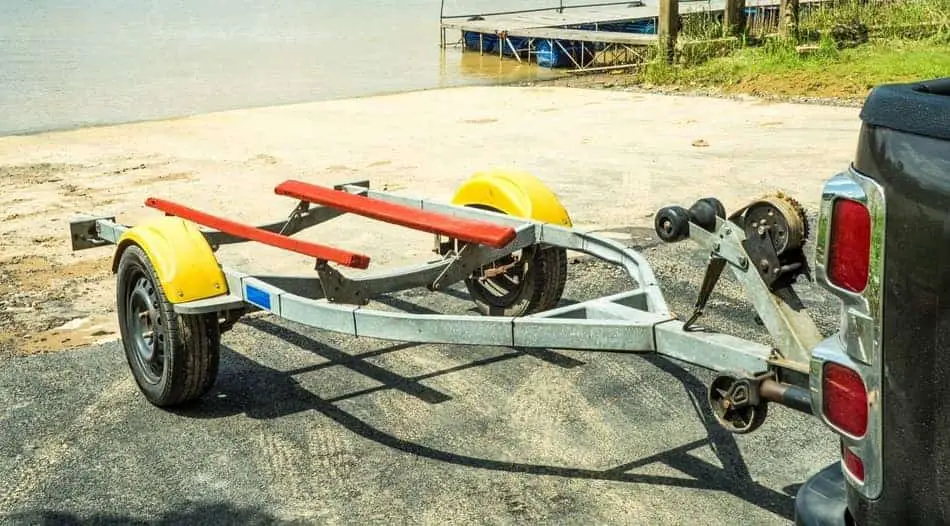Boats being expensive requires boat insurance since it deals only in thousands (dollars) if anything happens (accidents). But boat trailers aren’t the same as boats; they are less expensive than boats and won’t require more money for repairs. So, do boat trailers need insurance like boats?
The boat trailer doesn’t need insurance (by law); however, some boat insurance companies will cover trailers under their standard policy, and some won’t (it needs to be taken as additional coverage). So, depending on your usage and needs, you can decide whether trailer insurance is required or not.
Suppose you often use the boat trailer (every week or quite often) and go for long distances. In that case, it is highly recommended to take additional insurance coverage for the boat trailer alone. But by law, no state requires insurance for a boat trailer in the USA. So, at the end of the day, it’s your call.
Yet, few insurance companies may include the boat trailer insurance under the boat or auto or a homeowners insurance policy, but they may not cover all the damages. However, these policies may not be as flexible as a (separate) additional coverage only for your boat trailer.
Before looking at each insurance coverage’s details, you need to get familiarized with some of the insurer’s terms. You can skip these definitions part if you already know them.
1. Deductible – The deductible amount is the part of an insurance claim you have to pay. You can claim the insurance only if your insurance claim exceeds the deductible amount; otherwise, you can’t claim your insurance.
For example, a $10,000 covered loss with a $1,000 deductible will pay $9,000, which means you have to pay $1,000, and the insurance company will pay $9,000 for a $10,000 loss or damage. Therefore, look at those deductible amounts carefully before taking any insurance policy.
2. Coverage limits – The coverage limit is the total amount your insurance company will pay for any loss or damage. If your loss or damage exceeds that coverage limit, you have to pay the rest of the amount from your pocket.
For example, a $20,000 covered loss with a $15,000 coverage limit will pay you only $15,000, and you have to pay the rest of the amount, i.e., $5,000 from your wallet. Therefore, look at those coverage limits carefully before taking any insurance policy. However, you can increase that coverage limit by paying more premiums (money) each year.
Actual cash value vs. Agreed cash value
3. Actual cash value – The actual cash value is the amount you will get if you claim your insurance. The amount you will get depends on your boat trailer’s current (depreciated) value based on age or wear and tear. If you have a total loss, your policy may not provide enough coverage to replace your boat trailer.
4. Agreed cash value – The agreed cash value is the amount you will get if you claim your insurance. The amount you will get will be enough to repair or replace your boat trailer with the same type and quality up to the agreed value. This is preferable to actual cash value, and it’s ideally expensive as well.
That being said, we will first see each insurance coverages (all types) in a detailed way. We will then see how much they are going to cost and whether your boat insurance or homeowners insurance will cover your boat trailer or not?
Related post – What does boat insurance cover? A newbie guide Check this article to know more about boat insurance and its coverages. And to get answers for most searched FAQs on boat insurance covers.

What are the types of boat trailer insurance coverages?
We will now see the basic types of coverages under boat trailer insurance, which you may need to look at or ask them while purchasing one.
- Collision coverage – Collision coverage only covers your boat trailer’s damages, not for others. If you are involved in an accident and have collision coverage, it will pay for your damages only; it won’t pay anything for others.
- Liability coverage – Liability coverage pays if you cause any damage to others (both property and bodily injury). Liability coverage doesn’t cover your boating-related injuries or damages. So, it will cover the damages you caused to others.
- Comprehensive coverage – Comprehensive coverage pays for the damages caused to your boat trailer other than collision-related like theft, vandalism, fire, weather-related damages (hurricanes, storms, winds), etc.
- Roadside assistance – Roadside assistance coverage pays if anything happens to a towing vehicle. While trailering the boat, if your towing vehicle got any breakdowns, repairs, run out of gas, etc., roadside assistance coverage will cover that.
Those are the main types of coverages available for boat trailer insurance. Among them, collision, liability, and comprehensive coverages are similar to boat insurance coverages (they serve a similar purpose for the boat). To know more about those coverages in a detailed way, check this article, click here.
Important note – Generally, most insurance covers the damages only if they happened in the range of 100 or 200 miles or more/less, depending on your policy. If you go beyond that range, your insurer may not cover anything for you. So, it is crucial to look at those values before purchasing a policy.
Related post – Why do I need a boating license? Check this article to know the 6 benefits you will get if you have a boat license.
How much does boat trailer insurance cost?

After knowing the types of coverages in the boat trailer insurance, you may be wondering that boat trailer insurance could be expensive (with all these coverages)? So, how much does boat trailer insurance cost in general?
Boat trailer insurance will cost $30 on average, but depending on the insurance plan and the coverages taken, it could cost from $15 all the way to $80 or more. And, the boat trailer insurance price primarily depends on the taken coverages.
And it also depends on the type of trailer (like a single axle, bi axle, or tri-axle) and the coverages. As a rule of thumb, the boat trailer insurance would be 1.5% – 5% of the trailer cost. If the trailer is $1000, then the insurance premium will be from $15 to $50 or more sometimes.
You can simply take roadside assistance for $15 from BoatUS, and roadside assistance coverage pays if anything happens to a towing vehicle. While trailering the boat, if your towing vehicle got any breakdowns, repairs, run out of gas, etc., roadside assistance coverage will cover that.
So, based on the company, sometimes it requires less or more. For example, a progressive insurance company will pay your expenses if your trailer breaks down within 100 miles from home. They will reimburse you up to $500 to cover food, hotel, and other transportation costs.
You don’t need to take all those coverages; you can take what is necessary for you, which will decrease the insurance premium a lot. So, don’t take all coverages, increasing the insurance premium unless you use the boat trailer more often.
Want a discount on the boat insurance policy? Some insurance companies will give discounts if you complete a well-recognized boating safety course and carrying your license. Some insurance companies will also offer discounts even if you carry all the required safety equipment in your boat.
Does boat insurance cover the trailer?
Will boat insurance cover the boat trailer under its standard boat insurance policy, or you need to take separate insurance for your boat trailer alone?
Boat insurance won’t generally cover trailers in their normal or standard boat insurance policy; you need to add trailer coverage to the insurance plan. However, some insurance companies will cover boat trailers under the boat insurance, and some won’t.
So, whether your boat insurance will cover the trailer or not depends on the insurance company because some insurance companies will include the boat trailer coverage in the standard insurance plan (requiring you to pay more premium), and some won’t.
However, these policies may not be as flexible as a (separate) additional coverage only for your boat trailer because boat insurance may cover only some part of the damages caused to the boat trailer. On the other hand, (separate) additional coverage is dedicated to the trailer alone, covering more.
So, if you often use the boat trailer (every week or quite often) and go for long distances. In that case, it is highly recommended to take additional insurance coverage for the boat trailer alone rather than relying on the boat insurance policy to cover the trailer damage bills.
Boat trailer coverage pays if anything happens to your boat trailer (not the boat). For example, a progressive insurance company will pay your expenses if your trailer breaks down within 100 miles from home. They will reimburse you up to $500 to cover food, hotel, and other transportation costs.
Does auto or homeowners insurance cover boat trailers?
Will auto or homeowners insurance cover the boat trailer under its standard boat insurance policy, or you need to take separate insurance for your boat trailer alone?
Homeowner’s insurance will cover the boat trailer if anything happens to the boat trailer while parked or stored at home. And generally, it will cover small boats, not big boats, though. And, homeowner’s insurance will cover less compared to (separate) boat trailer insurance.
If anything happens to your boat trailer while it is stored or parked at home, then your homeowner’s insurance will give you some coverage. Since coverage on a home and on a vehicle is different, you may have gaps in coverage for your trailer if you only rely on a homeowner’s insurance policy in the event of a loss.
And generally, homeowners insurance will cover small boats (like Jon boats), not the big ones. And if the trailer is not stored or parked in the garage or at your home, then it may or may not cover your trailer, depending on how the damage has occurred.
As discussed before, these policies may not be as flexible as a (separate) additional coverage only for your boat trailer because they may cover only under certain circumstances. On the other hand, (separate) additional coverage is dedicated to the trailer alone, covering more.
So, if you often use the boat trailer (every week or quite often) and go for long distances. In that case, it is highly recommended to take additional insurance coverage for the boat trailer alone rather than relying on the homeowner’s insurance policy to cover the trailer damage bills.
The confusions while claiming the boat trailer insurance
There will be some confusion while claiming the boat trailer insurance because the boat trailer comes under many insurances (homeowners, boat, and separate coverage, if you take any). There could be some confusion and clash while claiming the boat trailer insurance.
Suppose you’re towing your boat to the lake and the trailer is damaged in an accident on the road. In that case, it’s the separate trailer coverage provided by your boat’s insurance policy that will pay for repairs or replacement of the trailer (not the homeowners or boat insurance).
Suppose you parked or stored the boat trailer at home and if the tree falls on the trailer due to heavy winds or storms. In that case, your boat’s insurance policy will compensate you, or you may also be able to make a claim on your homeowner’s policy (not full coverage, though).
Suppose if your trailer hits someone walking across in a parking lot. In these cases, it’s your auto insurance policy’s liability coverage that would pay for damages to other property or vehicles or any medical claims. And again, your boat insurance policy’s trailer coverage would take care of repairs to the trailer itself (source).
Similarly, there will be some other claims. Based on the accident type, where, and how it happened, the insurance claims will differ, confusing the owners a little. So, it is very crucial to look at your insurance coverages properly before agreeing to them.
The National Highway Traffic Safety Administration (NHTSA) reports that nearly 400 people were killed in traffic accidents involving a passenger vehicle towing a trailer in a year. The number includes both people killed when trailers came unattached, as well as other accidents involving trailers.
Insurance
The key takeaways from the post
By law, boat trailers don’t need insurance at all, but you can take insurance for a boat trailer based on your needs and usage. However, some boat insurance companies will cover trailers, and some won’t. Eventually, you can decide whether you need trailer insurance or not.
Homeowner’s insurance would give some coverage for your boat trailer if anything happened to your boat trailer when it was parked or stored at home or garage. Similarly, boat insurance also would give some coverage for your boat trailer along with the boat.
Finally, a (separate) additional insurance for your boat trailer will cover the most bills if you are involved in an accident. The homeowners or boat insurance will not cover your most damages. So, unless you often use the boat trailer or go for more distance, boat trailer insurance is not required much.
Please note:
The above is meant as general information and general policy descriptions to help you understand the different types of coverages. These descriptions do not refer to any specific contract of insurance, and they do not modify any definitions, exclusions, or any other provision expressly stated in any contracts of insurance.
We encourage you to speak to your insurance representative and read your policy contract to understand your coverages fully.
